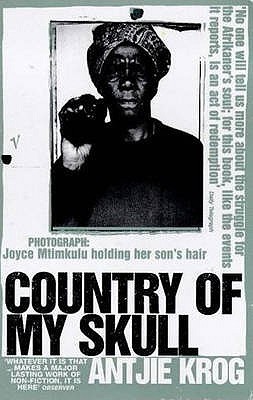What do you think?
Rate this book


454 pages, Paperback
First published January 1, 1998
[mother identifying her dead son...] I asked them, "Show me the mark on his chin, then I will know it's my son." They showed me the mark on his chin, and I said: "It's not my son."I've never taken an ethics course, but in my ignorant imagination of that field, I see an entire ethics course simply going through every last point this book raises. But it would probably have to span several semesters, maybe several years, because there's so much here to think about. Has there ever been a harder or more human task than the one the South African Truth and Reconciliation Commission was formed to address? The one that Antjie Krog attempts to write about from the inside out? Every testimony, every question, every decision to forgive or not to forgive is wrapped in the messy details of painful personal and political histories. Of frailty, weakness, judgement. Very little here is cut and dry, though there are perpetrators and there are victims.
Will a Commission be sensitive to the word 'truth'? If its interest in truth is linked only to amnesty and compensation, then it will have chosen not truth, but justice. If it sees truth as the widest possible compilation of people's perceptions, stories, myths and experiences, it will have chosen to restore memory and foster a new humanity, and perhaps that is justice in its deepest sense.Questions loom above the individual incidents, and the questions are not simply who was right and who was wrong. Questions such as--how does a nation heal? How do we reconcile when there is no ideal past to reconcile back to? How do we get past the bitterness? What is the purpose of a reconciliation commission? Will it become a witch hunt? Is it just a publicity stunt or will the truth come out? Is it truth we're after or justice and what's the difference? Does the larger goal matter, if it is a noble one, does it justify smaller cruelties? How does a journalist write about such events--or an artist? Should she stick to the facts, or insert her artistic license to bring out the truth behind the facts?
I hesitate at the word [“truth”], I am not used to using it. Even when I type it, it ends up as either turth or trth. I have never bedded that word in a poem. I prefer the word 'lie'. The moment the lie raises its head, I smell blood. Because it is there… where the truth is closest."And that's not even going into racial and women's rights issues--which as you can imagine are both front and center as well.
Mthintso says a man who didn't break under torture was respected by the police. 'There was a sense of respect, where the torturers would even say – “He is a man.” But a woman's refusal to bow down would unleash the wrath of the torturers. Because in their own discourse a woman, a black meid, a kaffermeid at that, had no right to have the strength to withstand them.Though the book could easily have turned into a mind-numbing litany of wrongs, and it would have been justified in doing so too, it wasn't. Antjie Krog goes above and beyond relaying testimonies, beyond the duties of an impartial un-biased fair-and-balanced journalist, into the territory of thinking, feeling, occasionally dead-wrong human-being. She wrestles with each idea, with each personal and national struggle in a chameleon-like display of writing that can at times be insightful, inspiring, poetic, analytic, emotional, political, historical, and even humorous--but always thinking and feeling deeply. What I really appreciated was that she did not disconnect from the pain, but faced it full on with all she had even though it was sometimes not enough. I appreciated that she was a white Afrikaner woman, that she was not some outside journalist, but someone highly invested and inside the process trying to work out the pain of her own nation.
It has to be this part of the country that turns us inside out, that renders us: bare lips. It has to be this region of fierce opposites—meadows & plains, waterfalls & dongas, ferns & aloes—that sparks from a speechless darkness the voices of the past. And at long last, flicking cigarette ash from our shoulders, we can weep in the certainty of this April; in the assurance of the testimony of fellow South Africans.
So I sit around. Naturally and unnaturally without words. Stunned by the knowledge of the price people have paid for their words. If I write this, I exploit and betray. If I don't, I die. . . .
We tell stories so not to die of life. (pages 66 and 64)